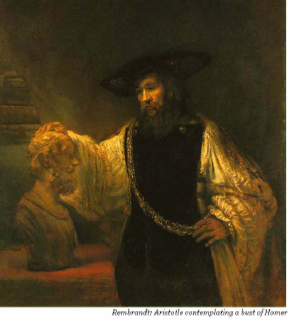The ancient Greek philosopher, Aristotle (384–322 BCE), regarded mimesis, or imitation, to be one of the distinctive aspects of human nature, and a lway to understand the nature of art. Aristotle describes the processes and purposes of mimesis.

Epic poetry and Tragedy, Comedy ... and the music of the flute and of the lyre in most of their forms, are all in their general conception modes of imitation. ... For as there are persons who, by conscious art or mere habit, imitate and represent various objects through the medium of color and form, or again by the voice; so in the arts above mentioned, taken as a whole, the imitation is produced by rhythm, language, or 'harmony,' either singly or combined. ...
Since the objects of imitation are men in action, and these men must be either of a higher or a lower type (for moral character mainly answers to these divisions, goodness and badness being the distinguishing marks of moral differences), it follows that we must represent men either as better than in real life, or as worse, or as they are. It is the same in painting. ...
Now it is evident that each of the modes of imitation above mentioned will exhibit these differences, and become a distinct kind in imitating objects that are thus distinct. Such diversities may be found even in dancing, flute-playing, and lyre-playing. So again in language, whether prose or verse unaccompanied by music. Homer [the epic poet and attributed as author or the Iliad and the Odyssey], for example, makes men better than they are; Cleophon as they are; Hegemon the Thasian, the inventor of parodies, and Nicochares, the author of the Deiliad, worse than they are …
The poet being an imitator, like a painter or any other artist, must of necessity imitate one of three objects—things as they were or are, things as they are said or thought to be, or things as they ought to be …
[T]o learn gives the liveliest pleasure, not only to philosophers but to men in general; whose capacity, however, of learning is more limited. Thus the reason why men enjoy seeing a likeness is, that in contemplating it they find themselves learning or inferring, and saying perhaps, ‘Ah, that is he.’ For if you happen not to have seen the original, the pleasure will be due not to the imitation as such, but to the execution, the coloring, or some such other cause. Imitation, then, is one instinct of our nature.
Aristotle. 350 BCE-c. Poetics. The Internet Classics Archive, MIT.. IV, I, II, XXV, IV.
